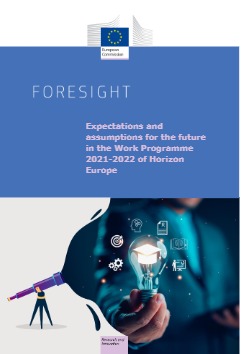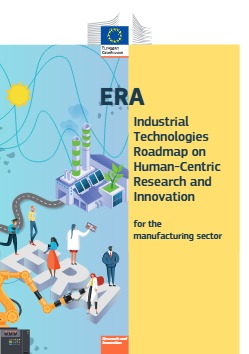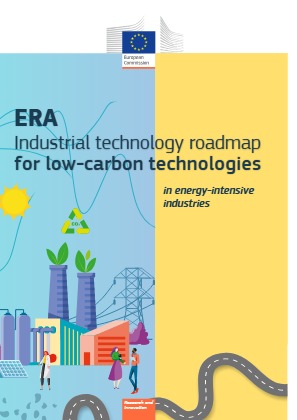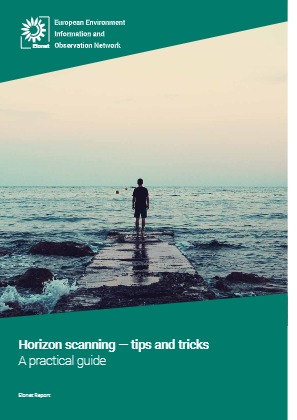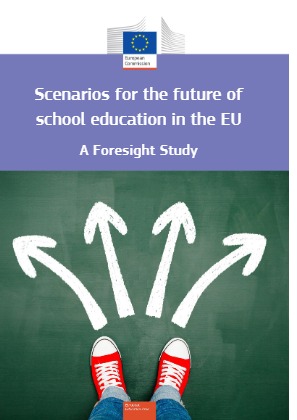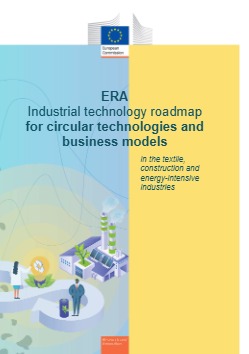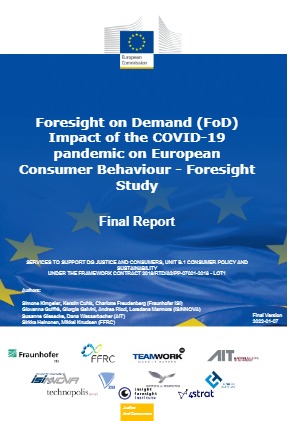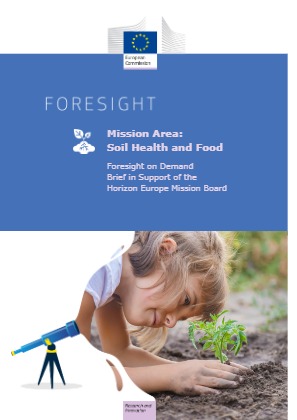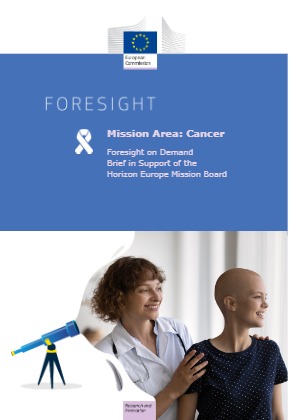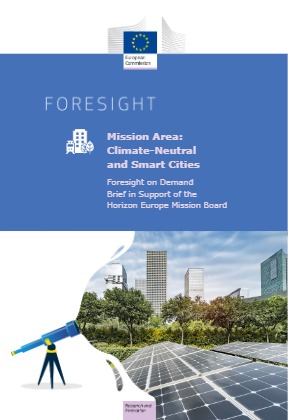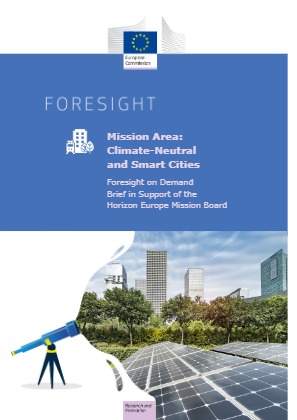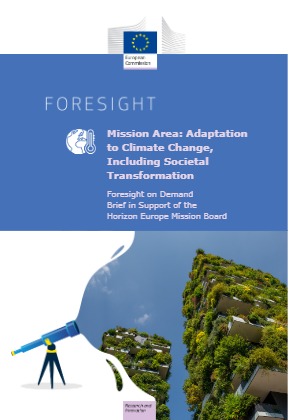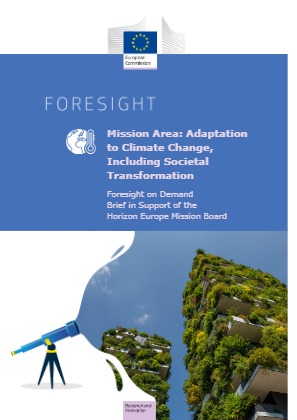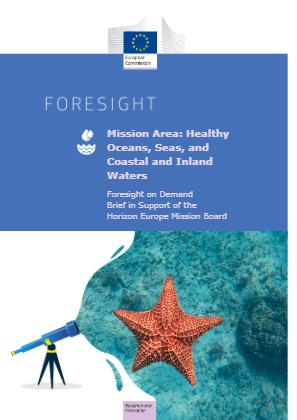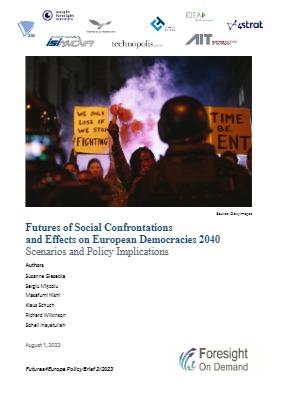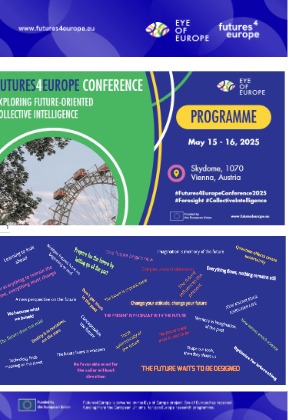The Covid-19 pandemic has shattered our sense of ‘normal’, and amplified uncertainties and issues at the core of what the future may hold. The project ‘After the new normal: Scenarios for Europe in the post Covid-19 world’ examined possible futures of 2040 for the EU emerging from the crisis of the pandemic, as possible contexts for EU R&I. The five scenarios described in this report chart different possible post-Covid-19 evolution paths, creating new perspectives on key EU R&I policy issues.
Control over technological development
Across all scenarios, the ability of the European Union to exert control over future technological development - through regulation, standardisation, and the enforcement of policy - entails wide ranging socio-economic implications for the broader society.
The EU share of global R&D is shrinking, and there is an unavoidable, growing EU dependence on technologies developed and produced elsewhere in the world, most notably in the US or China. There is also an ever-increasing influence of private firms on technological development, including large multinationals, which remain largely outside public control as regards potential societal consequences of the deployment of those technologies. The challenges these trends may pose to the ability of the EU to exercise control over technological development will depend on the speed of the recovery from the Covid-19 crisis and on the character of the relationships that will be built during the recovery effort.
Resilience, adaptability and preparedness for future crises
Resilience, adaptability and preparedness require an anticipatory R&I policy including ways of identifying, monitoring and addressing threats and developing new emergency response capacities that involve science in systemic roles: as a generator of advice, as a capacity for quick analysis, monitoring of the challenge and evaluating the efficacy of responses, as well as a generator of new responses and tools against the crisis. Preparedness should include:
- ‘Wind-tunnelling’ new plans, policies, and institutions through worst-case scenarios for alternative crises.
- Exploring regularly new modes of assessing threats and trialing emergency responses, which offer the possibility to explore hidden opportunities.
- Engaging research with all branches of government to share findings about threats and opportunities, and to foster more integrated and coordinated responses.
The key role of education
The Covid-19 crisis precipitates the introduction of a new wave of educational technologies, opening up new possibilities and engendering new challenges and risks. This could be heralding new opportunities for improving the relations
between science and education, and therefore strengthening the contributions of science to society, as well as new challenges of fracturing value and belief systems, populism and fake news. The availability of public funds for education and the role that private companies will play in new educational developments will be critical. EU R&I policy can contribute to improving the links between science, technology and education by supporting local experimentation in education in a framework that could help diffuse good practices across the EU.
EU level financing for R&I
After nearly 50 years of Framework Programme, EU direct funding for R&I projects has become part of the institutional backbone of the EU. The scenarios remind us that this is not given and that the EU budget is subject to political negotiations despite its importance for the maintenance of R&I capacity in different Member States. There is a continuous need for ensuring that the EU gets value for money out of its investments in R&I including the recognition of the benefit that Member States and EU policies across the board gain from the EU Framework Programme.
Regional disparities in R&I performance
The persistence of regional disparities in R&I performance has been a problem for the EU for a long time, and one that the EU has yet to resolve. The scenarios remind us that such disparities can develop into deep divide across the economy and politics of the European Union. Furthermore, the scenarios demonstrate how some modes of recovery can be better suited for enabling the more equitable generation of economic and social value from R&I, particularly in those regions facing greater present day challenges. Emphasis in social innovation, social entrepreneurship and frugal innovation in the EU instruments may make important contributions to overcoming regional disparities.
Defining future priorities in R&I policy
R&I policy priority-setting processes and the extent to which R&I priorities are driven by concerns with the past, current and future challenges vary across Member States of the EU. This affects the definiton of joint priorities as well as the diversity and vibrancy of the EU innovation ecosystem. Scenarios that explored conditions of challenging polarisation between different national interests and between public and private interests, highlight the importance of public engagement and especially of engagement with new actors, such as social-purpose companies, in the definition of future priorities of EU R&I policy as well as in the governance and implementation of the R&I effort.
Other emerging issues of relevance to EU R&I policy
Additional emerging issues that may deserve particular attention in the coming years include:
- Several scenarios suggest that there will be both a greater need and stronger willingness for Member States to collaborate closely on matters of R&I policy.
- The widening of the range of actors as well as of policies that matter for R&I, linked to the growing policy attention to system change will become an important challenge for coordination of efforts and policy coherence.
- With their strong emphasis on competitiveness and growth objectives, the established rationales underpinning EU R&I policy are increasingly out of synch with the needs of societal and world challenges.
- As the landscape of European knowledge systems continues to evolve, R&I policy must realise its influential role in shaping broader change and adopt socio-economic disparities and environmental concerns as guiding principles.
All scenarios suggest the need for stepping up collective capability and willingness to actively engage in open and collaborative R&I relationships, both within Europe and with the world beyond Europe. This is obvious in relation to some of the global challenges Europe is aiming to address, but also with regard to emerging technologies where international alliances are decisive for establishing common standards and regulation. In order to ensure a relevant global role of Europe in the world, it is essential to build upon a strong, stable and coherent home base in R&I.
This report is also available on Zenodo.


